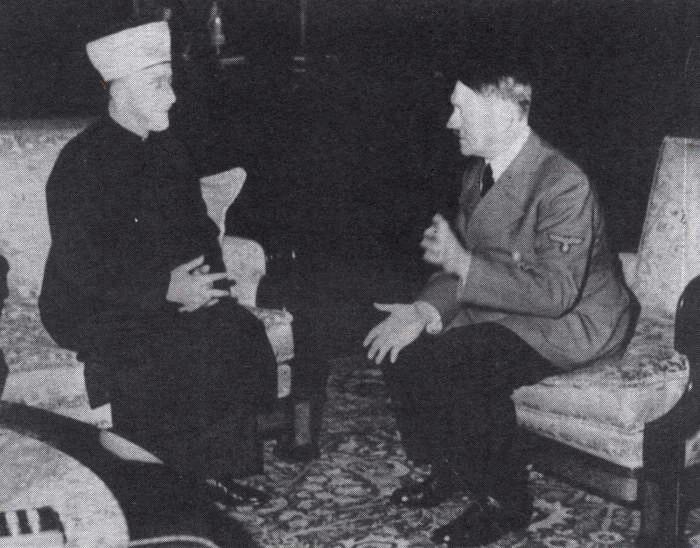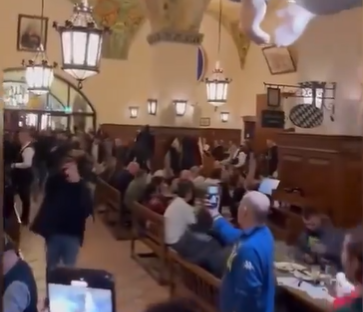On the night of February 27, 1933, an assistant to Adolf Hitler contacted Joseph Goebbels and asked him to inform the genocidal man – who had been in office for less than a month as Chancellor – that “the Reichstag is burning”.
The
flames of the German Parliament building
rose over the center of Berlin.
Goebbels described those words as "a crazy fantasy", but once he verified that it was true, he communicated it to his boss.
And he acted immediately.
They considered it a signal "for a communist uprising."
They already had their first detainee: a young man named Marinus van der Lubbe, Dutch, from a working-class family and who had been a member of the communists until recently.
These are details - later there would be a trial and van der Lubbe would be executed - but what is relevant is that from that night, Hitler and the Nazis, who even in the government did not yet concentrate all power, would be
implacable
.
And that the prophecies that just four weeks earlier, when President Marshal Paul von Hindenburg appointed Hitler Chancellor, were made by General Erich Luddendorf, who was not exactly a man of the left, would be fulfilled: "You have handed over our sacred German homeland to one of the greatest demagogues of all time.
I solemnly prophesy that this accursed man will plunge our Reich into the abyss and drive our nation into unthinkable misery.
Future generations will curse you in your grave for what you have done."
The Reichstag fire on February 27, 1933 in Berlin.
Photo: AFP
The origins
Hitler took office as chancellor on January 30 of that year after intense pressure and negotiations since, until then, the ultra-conservative and nationalist government of the presidency of the elderly Marshal Paul von Hindenburg resisted his extremist proposals.
But that disastrous date for history was not a coincidence, but a consequence: the echoes of the First World War, the establishment of the Weimar Republic in November 1918, the punishment imposed by the victors at Versailles, the hyperinflation of 1923, the
social catastrophe that Germany experienced
at the beginning of the decade of the same decade and the rise of xenophobic, anti-communist and revenge movements (among which Hitler was barely an emergent).
The historian and academic Jorge Saborido, in a recent article in Ñ, described that period as "a republican experience, underpinned by a democratic Constitution that was carried out in an extremely unfavorable context."
"From the beginning it had to face the double threat of those who longed for the empire and found the new reality alien and dangerous, and those who aspired to reproduce the Bolshevik experience of 1917 in Germany. The Social Democratic Party, the main promoter of the new political reality, was then immersed in a situation in which the consolidation of a progressive republic, defender of freedoms and with social content was attacked by the right and the left," wrote Saborido.
A century ago and based among extremists in Bavaria, Hitler launched his
first coup attempt, quickly liquidated
, which is remembered as "the beer hall putsch."
He ended up in jail, but there
his racist ideas and his megalomania
for him were consolidated, in addition to the proclamation of "Mein Kampf" and the theory of "living space" for Germany.
Parliament debates in a church in Potsdam, in March 1933, after the Reichstag fire in February.
Photo: AFP
The economic crisis of the late 1920s meant another devastating blow to that society.
Among hundreds of biographies of Hitler, that of the British historian Ian Kershaw is considered one of the most exhaustive and describes Germany before Hitler's rise to power: "The dark shadow of mass unemployment on an unprecedented scale hung over the country .
The unemployment offices registered 5,772,984 people without work at the end of 1932. Taking into account casual workers and concealed unemployment, it was admitted that the real total was 8,754,000.
That meant that about half of the workforce was wholly or partly unemployed.
Cities offered free meals, cheap or free hot baths for the unemployed, and heated shelters and premises to stay in winter.”
For those who still had jobs,
the climate was one of equal uncertainty
.
And for young people, adds Kershaw, “the Depression years had been terribly damaging materially and psychologically.
The forecast system was on the brink of collapse.
The rising rates of suicide and juvenile delinquency were indicative of what was happening.
Fear, bitterness and radicalization were part of an atmosphere of political violence.
These tensions of the Depression years had made political violence an everyday occurrence.”
On this breeding ground - where "desires for revenge" and the need for "scapegoats" also appeared - the Nazis went from a handful of votes (2.6% in 1928) to 37.2% in just four years.
And the most recalcitrant right - with decisive influence from bankers, industrialists and landowners - pressured President Von Hindenburg to summon the National Socialist Party to the government and appoint Hitler as chancellor.
Some did it with the naive argument that, in this way, they were going to neutralize the Nazi violence that was already being expressed in the streets.
When the former chancellor, the ever-scheming Franz Von Papel, was warned that the country was being placed in the hands of Hitler, he replied: "They are wrong, we have hired him."
Like von Hindenburg,
the Nazi leader was still underestimated
with the nickname of "bohemian corporal".
Finally the president capitulated and appointed Hitler chancellor, although giving him only two cabinet posts.
"Well, gentlemen, now go ahead with God's help," von Hindenburg managed to say.
Members of the Nazi party, in an assembly in March 1938. Photo: AP
The Nazis celebrated that same night with a torchlight parade through the wide avenues of Berlin.
“Hitler, Chancellor of the Reich.
It's like a fairy tale, ”exclaimed Goebbels, his propaganda chief.
One of the Catholic newspapers headlined: "A leap into the dark."
Hardly assumed and in his speech before Parliament, Hitler prophesied: "Give me four years and you will no longer recognize Germany."
It must be recognized that, unfortunately, he fulfilled it.
First repressive measures
He immediately had Hindenburg dissolve Parliament and call new elections, which gave him
five weeks without parliamentary control
.
On February 4, he obtained from the president another decree that prohibited criticism of the government and suppressed the freedom of assembly and of the press of left-wing organizations, in order to liquidate them from electoral competitions.
The end of an era Hitler, who from his inauguration until the night of the Reichstag fire had moved cautiously, did not take any longer.
The next day he forced the signing of a decree for the "protection of the people and the State"
suspending individual freedoms, expression, press, association, assembly and communications
, authorizing the authorities to carry out searches, arrests and confiscations.
It was his first tool to establish his dictatorship, since they immediately closed down newspapers, arrested opponents and prohibited public demonstrations.
In the elections on March 5, the Nazis rose to 44%, but they needed two-thirds of Parliament to have a law of extraordinary powers.
They did not stop for that: with the arrest of the socialist deputies, they reached a majority and on March 23 they sanctioned the "enabling law to solve the dangers that threaten the people and the State."
That date is interpreted as
the end of the Weimar Republic and the beginning of the Third Reich,
the one that Hitler and his followers once promised would last "a thousand years."
The immediate measures indicated what would be the extremist drift of Nazism: On March 23, Goebbels took over as Minister of Propaganda, a position he already held in fact.
On the 24th, Hitler announced
"the need for a cleansing of intellectual life."
Goebbels took control of the German media and all cultural life.
Adolf Hitler at a funeral ceremony in Berlin, in front of the Reichstag, in 1935. Photo: AP
On April 7, they decreed the "Aryan closure of the civil service law."
That meant the expulsion of Jewish judges, lawyers and university professors from all their activities.
On May 10, his fascist gangs (the Brownshirts and the Hitler Youth) raided and looted libraries and bookstores throughout Germany.
They burned 25,000 books (an act that decades later would find imitators on our soil).
Saborido summarized it: “The rapid destruction of republican institutions and the establishment of a totalitarian state that Hitler achieved in a few months were not exactly his objectives, but the “Austrian corporal” had the strength and determination to transform the country and lead it to the abyss of a new war, in which he left an insurmountable mark of destruction and inhumanity”.
The guillotine
The young van der Lubbe was arrested inside the Reichstag at 9:25 p.m. on the night of the fire.
Within a week, they arrested the head of the communist parliamentarians, Ernst Torgler, who came forward voluntarily, and three Bulgarian communists residing in Berlin: Georgi Dimitrov, Simon Popov and Vassili Tanev.
The instruction of the prosecutor Paul Vogt presented more than a hundred folders at the beginning of the trial, on September 21 in Leipzig, but the communist leaders refuted them, proclaimed their innocence and proved that they were not even in Berlin on the night of the fire.
Van der Lubbe always appeared depressed, as if sedated.
And Dimitrov, who would soon become one of the most prominent communists (secretary for a decade of the Stalinist-run Third International and prime minister of Bulgaria at the end of the war), blamed the Nazis squarely for the fire.
He did it in front of Herman Goering, face to face, in a new version of "I accuse".
The four leaders were acquitted and Van der Lubbe was executed by guillotine on January 10, 1934
in his Leipzig prison.
Three days later he was going to turn 25...
At the end of the war and during the Nurenberg trial, Göering denied that the Nazis had anything to do with it (and that it was a self-attack to have an excuse and definitively seize power).
But at the same time, Hans-Bernd Gisevius, a former Gestapo agent, denounced that the fire was carried out by ten henchmen of the SA (the Stormtroopers, later annihilated by the SS).
Franz Halder, chief of the Army General Staff between 1938 and 1942, also declared that he had heard Göering boast about that fire.
In 1960, a series of articles signed by Fritz Tobias in the weekly
Der Spiegel
pointed out that Van der Lubbe acted alone, but that the Nazis were innocent in this case and that "the defendants received a fair trial", despite Hitlerite pressures. .
As in so many things,
the truth remained in the haze.
On January 10, 2008, the German Federal Court of Justice overturned the death sentence (by a law passed ten years earlier, which allowed for the rehabilitation of those convicted during the Nazi era).
They justified that annulment by "the specifically National Socialist unfair conclusions" on which the December 1933 ruling had been based. Marinus van der Lubbe was acquitted, exactly 74 years after his beheading.
BC
look also
As in the Cold War, Europe returns to prepare its population after the Russian invasion of Ukraine
Vladimir Putin recalls the battle of Stalingrad and affirms that Russia has "with what to respond" to the shipment of tanks









